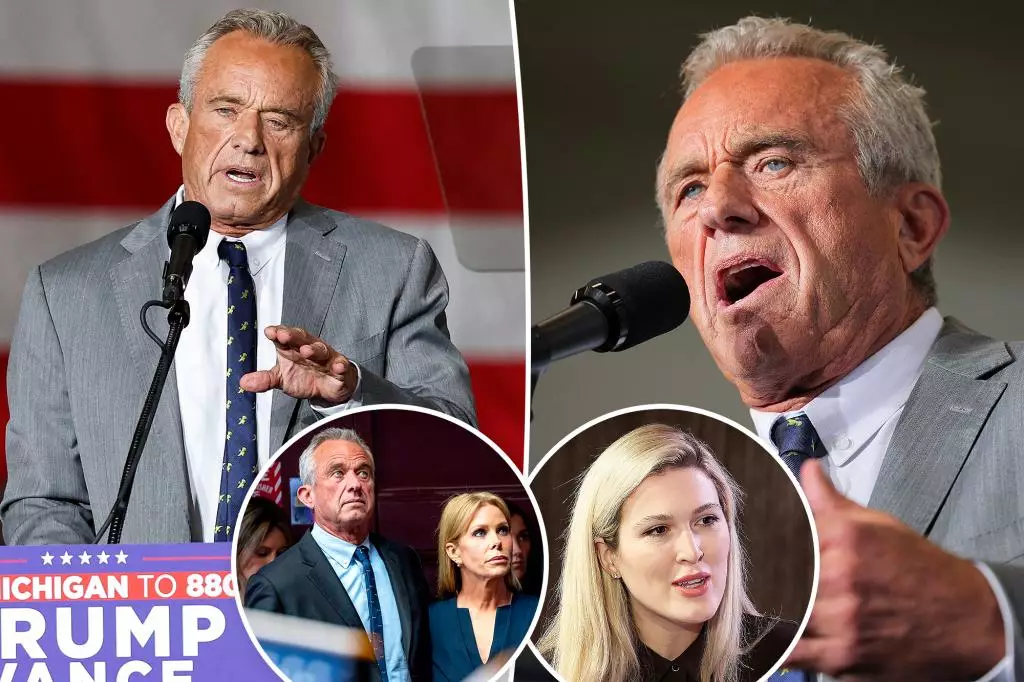In an era defined by the intersection of personal lives and public responsibilities, few figures encapsulate this duality quite like Robert F. Kennedy Jr. Recently thrust into the limelight due to a sexting scandal involving New York Magazine writer Olivia Nuzzi, Kennedy remains undeterred in his public push for nutritional reform. This juxtaposition of his personal tribulations with his professional commitments raises pressing questions about the sincerity of public figures navigating both realms.
Kennedy’s recent appearance at a Senate roundtable discussion titled “American Health and Nutrition: A Second Opinion” in Washington, D.C., stands as a prime example of how he seeks to pivot focus back to his advocacy. Spearheaded by U.S. Senator Ron Johnson, the panel also featured prominent figures like Jillian Michaels and Dr. Jordan B. Peterson, positioning Kennedy alongside influencers in health and wellness. Despite an undercurrent of controversy surrounding his personal life, reports indicated that he maintained a surprisingly upbeat demeanor during the discussion, with an observer noting, “He seemed great to me!” This raises intriguing considerations about the resilience of public personas under scrutiny.
Kennedy’s advocacy is deeply rooted in his critique of ultraprocessed foods and systemic issues within the food and pharmaceutical industries. His assertion that the corruption of regulatory bodies like the USDA and FDA complicates food safety reflects a growing concern among consumers about the veracity of public health information. During the discussion, he argued that the American health crisis is not merely a product of individual choices but rather the result of an industry that skews regulations for profit. “You can’t trust what’s on the ingredient label…” Kennedy remarked, underscoring his stance on corporate influence in public health discussions. This perspective, albeit controversial, resonates with a significant portion of the public frustrated with the current state of food regulation.
Kennedy has garnered attention not just for his nutritional discourse but also for his alarming statements regarding obesity and its historical context. He remarked, “One hundred and 20 years ago, when somebody was obese, they were sent to the circus…” This provocative assertion serves to underscore his belief in the societal shifts that have occurred in perceptions of health and wellness. However, such rhetoric also invites scrutiny, as critics may argue that sensationalism does little to address the multifactorial nature of obesity and public health. Thus, while Kennedy’s retelling of past societal attitudes toward obesity captures attention, its implications must be analyzed carefully.
Amidst advocating for a healthier America, Kennedy’s political positioning cannot go overlooked. His decision to endorse Donald Trump following his exit from the presidential race illustrates a strategic maneuver aimed at aligning with influential political figures in hopes of gaining traction for his initiatives. The remark, “Don’t you want a president that’s going to make America healthy again?” is a calculated appeal to public desire for health-oriented leadership, albeit embedded in the complexities of contemporary political discourse. This move not only ingratiates him with supporters of Trump but also places him within a wider context of health reform that transcends individual politics.
In an era where scandals can overshadow achievements, Kennedy’s handling of the allegations surrounding his sexting affair has been notably guarded. He opted not to comment directly on the situation during recent public appearances, which suggests a strategic avoidance of potential distractions from his advocacy work. Kennedy’s willingness to redirect conversations towards significant issues like health, inflation, and geopolitical concerns reflects a determined focus on maintaining his public image amidst personal controversy. “If you want to talk about health… I’m happy to talk,” he stated, reflecting an awareness of the need to prioritize critical issues over personal scandals.
Robert F. Kennedy Jr. continues to be a polarizing figure, embodying both the fervor for nutritional reform and the scrutiny of personal controversies. As he navigates these complexities, his ability to communicate pressing health issues while managing personal scandals raises critical questions about authenticity in advocacy. Whether celebrating his dedication to dietary reforms or questioning the methods by which he seeks to advance this agenda, one thing remains clear: Kennedy’s presence in the health dialogue will persist, challenging both public perceptions and institutional norms as he advocates for change.
